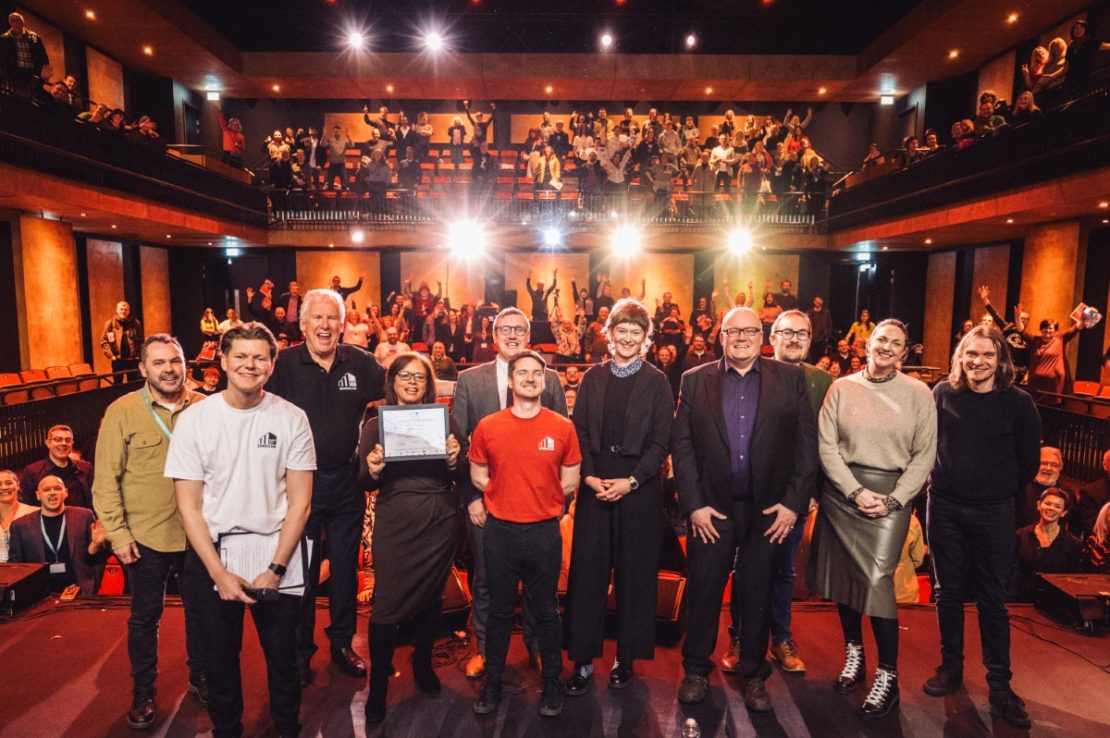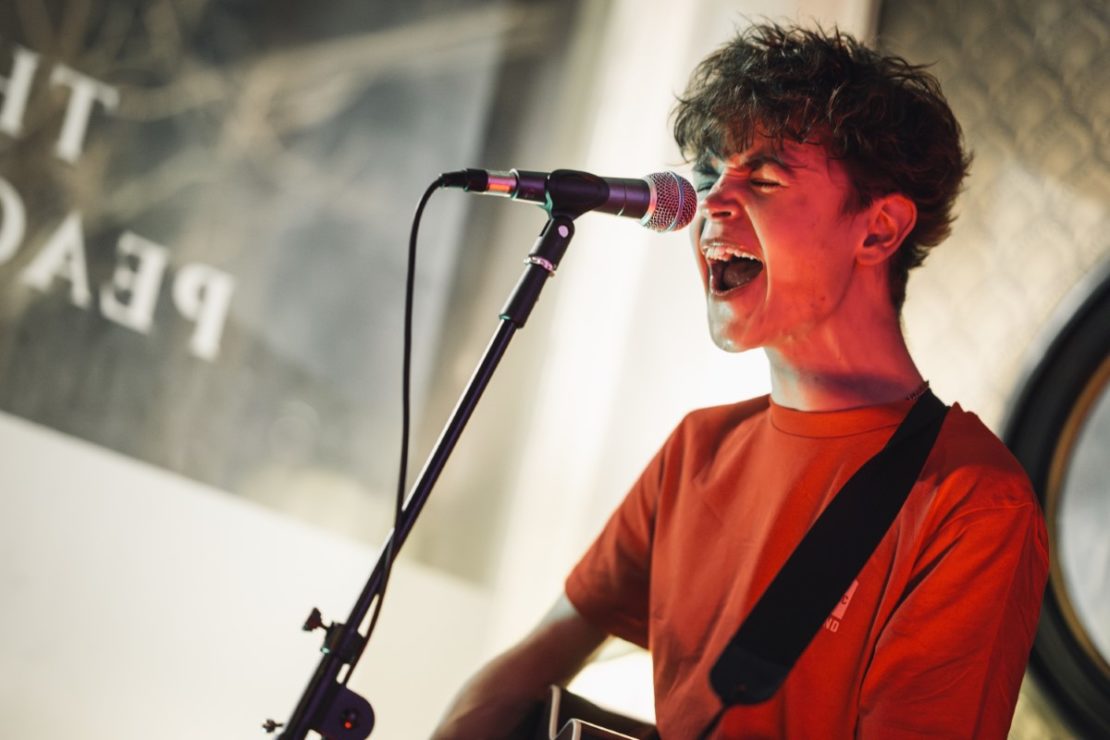
Thinking of setting up a business in the music industry but not sure where to turn or who to speak to?
Frankie & The Heartstrings’ lead singer, Frankie Francis, recalls his experience of setting up and outlines why he believes there’s never been a better time to be part of the North East’s vibrant music scene…
Music is such a rewarding career, but there’s no shying away from the fact that it can be very challenging. And tiring.
From Sunderland to Swindon, towns and cities across the UK are oozing with creative talent, but for too long, the vast majority of those people just haven’t received the support they need.
While lots of funding streams and support programmes have been launched to drive growth in the more traditional industries, the arts have long been overlooked when it comes to driving economic growth, despite the music sector alone generating an economic impact of over £7billion for the UK annually.
Add to that rising fuel and hotel fees, the demise of grassroots venues and festivals and barriers to entering the European market… and to say it’s been a challenging time for those of us in the industry is putting it lightly.
Yet, despite all of that, the pros still massively outweigh the cons and I firmly believe that there’s no career in the world as rewarding as a career in music.
Here’s why…
Support is improving
Creatives haven’t been dealt the best of hands over recent years, but things are getting better.
New support programmes such as those delivered by the North East BIC, thanks to funding from the UK Shared Prosperity Fund (UKSPF), are helping more people than ever before to set up and grow music businesses.
The PRS Foundation has also ramped up its efforts to fund new music and talent development and we’ve seen increased funding from Arts Council England, both of which are helping make the sector more inclusive by breaking down the barriers to entry for people from all backgrounds.
Sunderland is booming
I had the privilege of working on Sunderland’s Music City status, which was officially announced at the BIC’s Growth Lab event in January at The Fire Station.
The project has seen Sunderland join Manchester as only the second UK city to be part of the Music Cities Network and will provide a major boost not only to the city, but the entire North East music scene.
Companies and acts now have a new reason to connect with Sunderland. New programmes will be launched to encourage collaboration and develop skills and an evolving music strategy – shaped by the city’s artists, creative businesses and the city’s people – will help grow the sector and drive innovation. It will be huge for the city.

Pop Recs, Independent and the Fire Station have a calendar stacked with great gigs and further recent investment into the Stadium of Light will enhance the city’s offering.
Then there’s the proposed Crown Works Studios on the banks of the River Wear, which once complete, will be a world-leading tv and film studio.
Of the 8,500 jobs proposed for the development, around 80% are said to be in ancillary roles, such as joinery, electrical maintenance and logistics… but also sound engineers, lighting designers and techs.
All of this means we can now say, figuratively and literally, what we have always known, that Sunderland is a Music City.
Devolution is delivering
The introduction of Metro Mayors has empowered regions across the UK by allowing them to have a say over where funding is allocated, and we’ve already seen how this is delivering for the North East. We will be advocating for Sunderland at every opportunity.
I know the difference music can make to people’s lives. We want music to drive the city from a cultural, economic and social point of view, giving the city an identity that gives civic pride to the people.
We need to protect grassroots organisations, such as The Bunker and We Make Culture in Sunderland, both of which play a key role in nurturing young talent and inspiring the next generation of musicians.
I think almost every musician has been told ‘to get a real job’ at some point in their life, and programmes and organisations like this are key to educating young people and their parents about the exciting career opportunities available in the industry. They are also key to building confidence, which is one of the things that so often holds people back, especially for those from working class backgrounds.
We are always collaborating
Musicians are collaborators by nature. It’s one of the first things you do when you start out as a kid and it never really leaves you. Which is why we are probably so good at it as an industry.
Musicians are particularly supportive during an artist’s development stage, often sharing their experience, expertise, and knowledge to help develop a new individual’s creative ideas.
This is also true of success in the sector. Musicians who have enjoyed success will always encourage the next wave of creatives to develop by offering support slots, both in the city and on tour, or by releasing music from an established platform.

And I’ve witnessed this first-hand. I’m always speaking to others and sharing best practice, and because we’re all in the same boat, you’re never short of people willing to lend an ear and share advice, which is particularly handy for those just starting out. It’s an industry which is just made up of great people doing great things.
So, if you managed to make it past the first few paragraphs without being scared off and are still thinking of setting up a music business, here are three top tips to help you on your way…
1. Always remember why you’re creating in the first place – be it expression, because you love doing it or to hang out with likeminded people – always remember why you’re doing it, and the work will always feel a lot easier.
2. Make the most of support. There are plenty of business advisers and support programmes out there to help you out, and the BIC is a great place to start. They can help with accessing grants, support and even finding office space. But also ask others in the sector for help and advice. People are willing to help.
3. I know it’s the boring part, but the sooner you start taking it seriously as a business, the sooner you will feel the benefit. Sign up to PRS and PPL who have their own initiatives. Check out the Musicians’ Union. Take funding as an example. There are lots of support programmes out there now for sole traders and start-ups, but they’re only applicable once you’re registered as a business.
Sign up to the next Growth Lab Masterclass and hear from Bernard Butler, one of the most celebrated names in the UK music industry. Learn how to have a career in the music industry, how to grow your business and ways you can diversify to keep your head above the water while working in the music industry in 2025. Click here to find out more.
Need further advice? Contact the BIC to speak to one of our friendly team on: 0191 516 6111 or request a call back here.
The start-up support from the BIC forms part of the Enterprising Sunderland project, which has received £1,271,885 from the Government’s UK Shared Prosperity Fund Programme, managed in Sunderland by Sunderland City Council on behalf of the Sunderland Partnership.
Enterprising Sunderland is the overarching title for this business support programme and is funded by the UK Shared Prosperity Fund. Delivered by a unique consortium of delivery partners in Sunderland working together to stimulate entrepreneurial ambition across the city.
